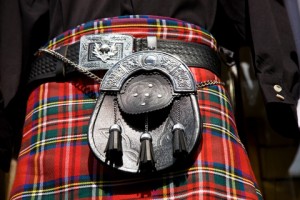My Outlander Obsession

I am stunned that Scottish citizens voted against splitting from the United Kingdom earlier this month. Didn’t they see how an English dragoon tortured Jamie Fraser on Outlander? Granted the English assault on Jamie took place in the 1740s and was entirely fictional. But still, I expected some more anti-Brit fervor among the Scots!
I’ve been watching the Outlander mini-series on the Starz channel over the last two months. The series is based on the books by Diana Gabaldon, which tell the story of a WWII combat nurse who travels back in time to 18th century Scotland and meets and marries a gallant Scot who is also an outlaw. I enjoy the story of the smart heroine and the dashing Scotsman in a kilt who eventually wins her heart. I’ve watched each of the episodes aired thus far at least two times. (Okay, I watched the wedding episode three times, but solely to do research for this blog.) And I’m not the only one hooked by the story. The Starz network renewed the series for a second season because of high ratings. The book Outlander, which was originally published in 1991, is number six on The New York Times combined print and e-book bestseller list, which is surely attributable in part to the popularity of the mini-series.
What makes well-educated women fall for these historical romances? And why am I somewhat embarrassed to admit how much I like both the books and the mini-series? Part of me worries that such pleasures mean that I am not a serious reader, much less a serious writer. I came back from a month-long writing workshop this summer with a long reading list. Like many of my fellow students, I went into those sessions thinking I was a fairly well-read person, and came out feeling illiterate. I left with a long list, which I promptly took to my favorite bookstore, the Strand in New York City. Some of the books on my self-prepared syllabus were by authors who came to read at the workshop, others were mentioned by teachers to illustrate a point about technique. Still other books were referenced so many times by so many people that I felt like an idiot not having read them. And then there were all the books that workshop leaders and my classmates specifically recommended to me as models that can provide me with some guidance as I make choices in my revising my novel in progress.
So I feel somewhat guilty when I don’t pick up one of the thirty books piled on tables throughout by house and instead read the fifth book in the Outlander series or, even worse, watch it on television. I say somewhat guilty because I also realized something important about my reading habits at the summer workshop. For me, reading is akin to hiking, a pastime my husband and I took up 25 years ago. We have been on hundreds of hikes, ranging from easy strolls on relatively flat terrain to 3000 foot ascents into snow covered peaks that require poles and crampons. We are careful in selecting our hikes on any given day, taking into account the weather, the trail conditions and, most importantly, our assessment of how far we want to push ourselves. Sometimes we want to go all out and take on a particularly challenging hike that will reward us with a spectacular view. Other times, we want something less strenuous that may not offer the same breathtaking vistas but is still pleasurable.
I select books to read on any given day in much the same way. Sometimes I want the challenge, I want to tackle the book that offers rewards in return for my commitment to be alert and attentive to all the nuances of language and subtle connections and references in the text. Other times I yearn to read something more accessible and less demanding, but that won’t insult my intelligence like the “bodice rippers” that one typically associates with the term historical romances. Yes, there is some bodice ripping in Outlander. But what really engages me is seeing how a capable and strong-willed woman tries to maneuver through a society in which women are relegated to a subservient role. That is why I find another popular series, the All-Souls Trilogy by Deborah Harkness, equally compelling. In the second book in the trilogy – Shadow of Night – the heroine, a strong-willed scholar, travels back in time to Elizabethan England with her husband and must interact and outwit some of the era’s most famous figures to achieve her objectives. The heroine is a witch and her husband is a vampire, but the historical detail is spot on. Indeed, author Deborah Harkness is herself a scholar who currently teaches European history and the history of science at the University of Southern California in Los Angeles. These books give me the satisfaction I seek when I am not up to a 3000 foot ascent but still want to feel that I have invested my scarce time wisely.
The Outlander mini-series had its mid-season finale last Saturday night. Like many others, I eagerly await the return of the second half of the season in April 2015. In the meantime, I researched what countries the series has been seen in and discovered that Outlander has not yet aired in Scotland. This is indeed unfortunate for those who supported Scotland breaking away from the United Kingdom. I am positive that if Scots had witnessed how English soldiers brutalized an innocent Jamie Fraser, the vote would have been closer than the 55 to 45 percent against dissolution of the union.


